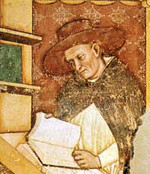
William of Peter of Godin (Guil(l)elmus Petri de Godino) can be considered one of the most influential personalities of the Dominican Order between the end of the 13th and the first decades of the 14th century. Born about 1260 in Bayonne, he entered the convent of the city at an early age. From 1284 to 1286 he studied theology at Montpellier and then became lector in theology in 1287 at Bayonne and in 1290 at Montpellier.
William was also entrusted twice with the office of General Preacher in 1289 and 1300. From 1292 to 1296 he studied in Paris, in 1296 he was sent to Toulouse to lecture on the Sentences of Peter Lombard and in 1299 he returned to Paris in order to lecture on the Sentences again and remained there until 1301. On this date he was elected Prior Provincial of Provence and, after the division of the province, he became the first Prior Provincial of the new province of Toulouse.In 1304 he became master in theology and during his mastership, probably in 1305, he held a disputation with Duns Scotus on the principle of individuation and defended the Thomistic view on this subject. In 1306 Godin was designated as lector curiae, in 1312 Clement V created him cardinal priest with the title of Santa Cecilia and in 1317 John XXII appointed him cardinal bishop of Sabina. Cardinal Godin served the Holy See as a diplomat at the French court between 1308 and 1310, in Gascoigne in 1312, in the Flanders in 1318 and in Spain between 1320 and 1324. He was appreciated also for his theological competences and was appointed to the commission charged with investigating the doctrines of the Spirituals between 1310 and 1311, thereafter entrusted with the evaluation of the orthodoxy of the Postilla in Apocalypsim of Peter John Olivi between 1318 and 1319 and in 1325 he led the case against Hubert of Casals.
He was not only a skilled diplomat and politician but also an esteemed scholar who left several works: the already mentioned Quaestio de individuationis principio (probably 1305), De nuptiis Christi Domini et Ecclesiae (1310-1311), the treatise on political ecclesiology De causa immediata ecclesiastice potestatis (around 1318), Acts of the Council of Valladolid (1322), De paupertate Christi (around 1325). Two further treatises (Contra unitatem intellectus and Contra aeternitatem mundi) are attributed to him, who also left a testament (22 December 1335).
His most important work is the so-called Lectura Thomasina, a commentary on the Sentences that, according to Bruno Decker, was completed and published around 1300-1301, shortly after the period which Godin spent in Paris as a lector Sententiarum.